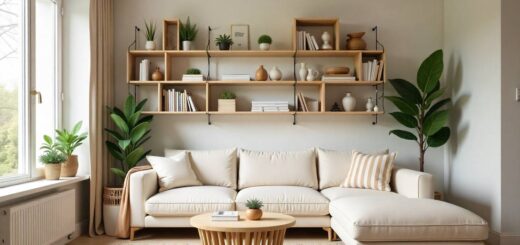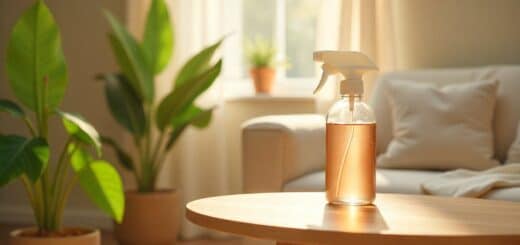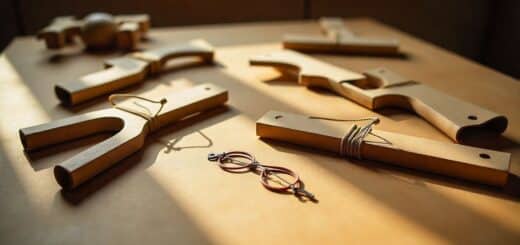How to Water Plants While Away for 2 Weeks [DIY]
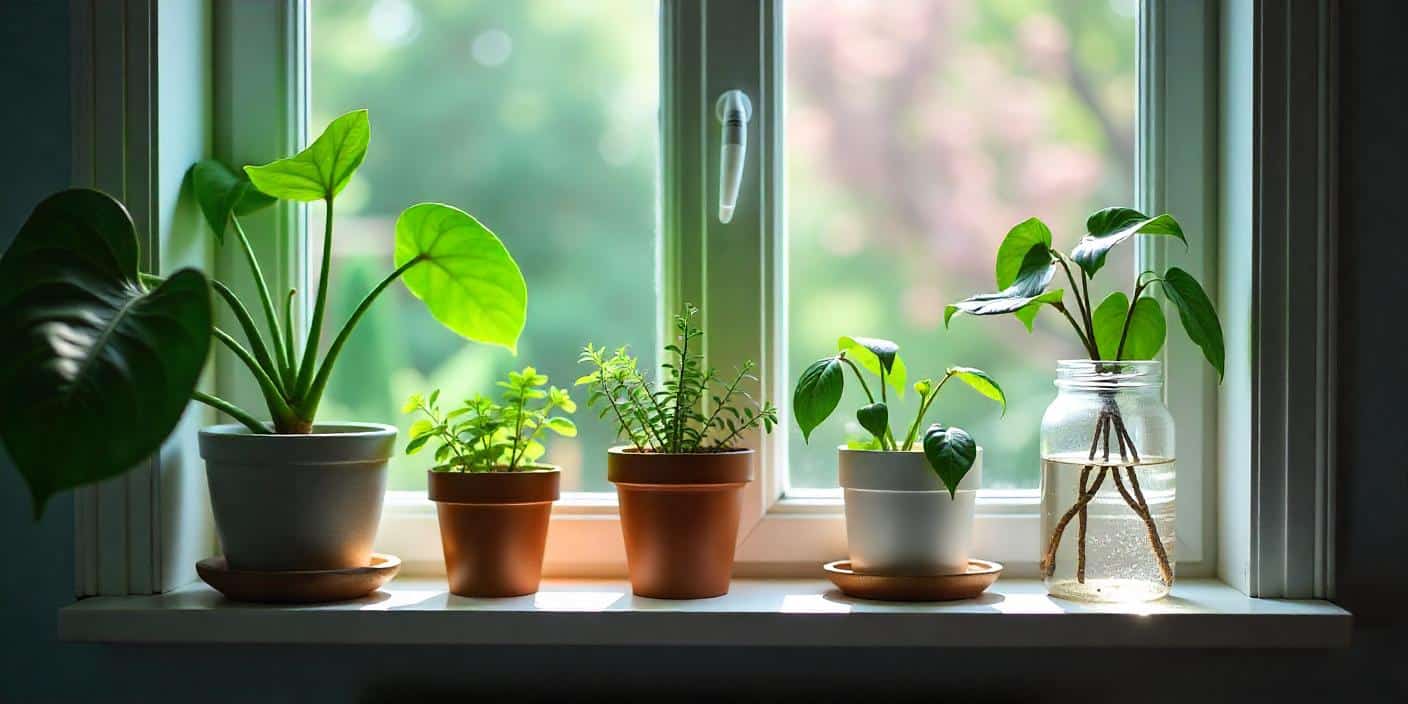
When I left my Los Angeles apartment for a month, I thought my plants would be fine. They weren’t. I came home to crispy basil, limp pothos, and a fiddle leaf fig that looked done with life.
It’s frustrating, right? You plan a trip, pack your bags, and in the back of your mind you’re worried about whether your plants can survive without you. They can, but you need a system in place. The good news is you don’t have to buy expensive gadgets. With jars, cords, bottles, and a little prep, you can keep them healthy for weeks; even months. Let’s see how.
Contents
Materials And Tools Checklist
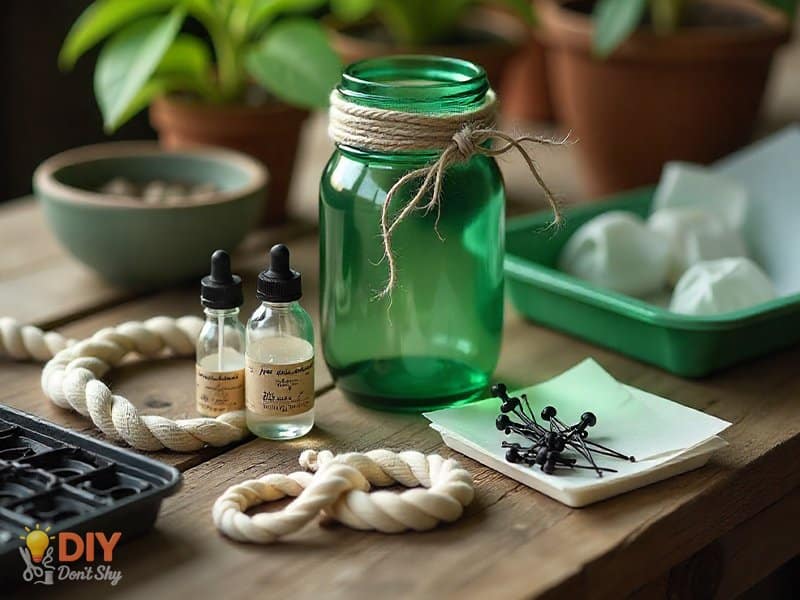
Houseplants Kit
- Cotton or nylon cords, about the thickness of a pencil
- Glass jars or containers
- Plastic bottles (1–5 liters)
- Push pins or nails for holes
- Waterproof trays or boot mats
- Clear drop cloths or humidity bags
- Painter’s tape and a marker
- Optional moisture meter
Outdoor Kit
- Battery-powered water timer
- Drip tubing and fittings
- Adjustable drippers or stakes
- Rain barrel or lidded trash can
- Hose splitter and backflow preventer
- Shade cloth with landscape staples
Budget Swaps And Eco Tips
You don’t need to spend much. Cotton strips from an old T-shirt make solid wicks. Wine bottles are great reservoirs. Buckets can hold water for multiple plants. DIYDONTSHY always recommends repurposing first; buy later.
Time And Difficulty
Setup usually takes an hour. If you’ve got a jungle at home, maybe a bit longer. Nothing here is complicated. If you can tie knots and poke a hole in a bottle, you’re ready.
Always test a week before leaving. That way you know what works and what doesn’t.
Core Methods That Work For Most Homes
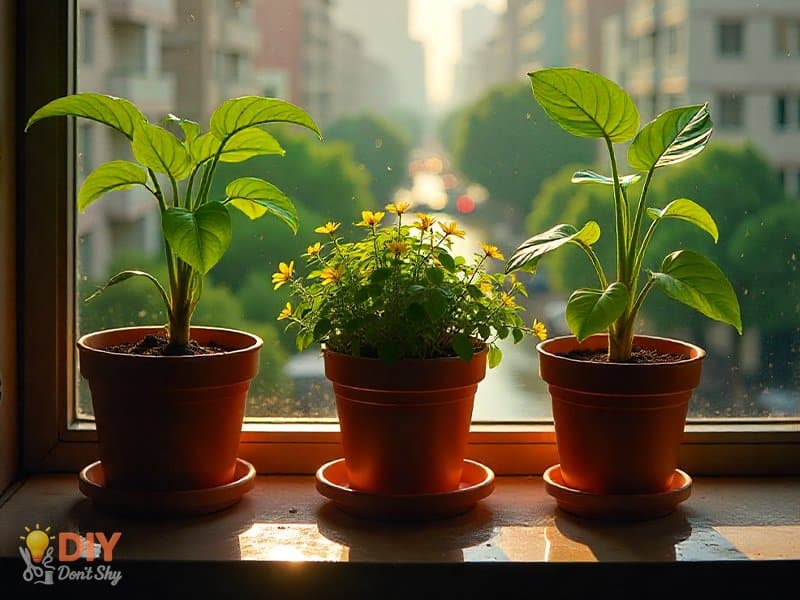
Capillary Wick Systems
A wick draws water from a container into soil. Simple. It gives steady moisture and prevents overwatering. Perfect for smaller pots and herbs.
Reservoir And Gravity Setups
Bottle upside down, tiny hole in the cap, drip drip drip. That’s the idea. The higher you place the container, the faster the water comes out.
Humidity And Microclimate Boosters
Group plants together. Tent them with clear plastic so moisture hangs around. Think of it as a cheap indoor greenhouse. It works surprisingly well.
How To Water Plants While Away For 2 Weeks
Wick Method Step By Step
- Put a jar of water next to your plant.
- Cut an 18-inch cord and soak it.
- Push one end a few inches into the soil near the rim.
- Drop the other end into the jar.
- Water the plant before leaving.
- Label the jar if you’ve got many.
This is simple and steady. It’s enough for two weeks.
Water Bottle Dripper For Quick Trips
- Fill a bottle.
- Make a small hole in the cap.
- Poke two air holes near the top.
- Flip it and push the neck slightly into the soil.
- Test for a slow drip.
Quick to set up. Great for short breaks.
How To Water Plants While Away For 3 Weeks
Dual Reservoir Plan
Switch to bigger containers. Use two wicks per pot. If the reservoir is slightly higher, water flows better.
Grouping And Tenting Strategy
Gather plants that need the same care. Cover them with a plastic sheet, leaving gaps for air. Add a shallow pan of water in the middle for extra humidity.
How To Water Plants While On Vacation For A Month
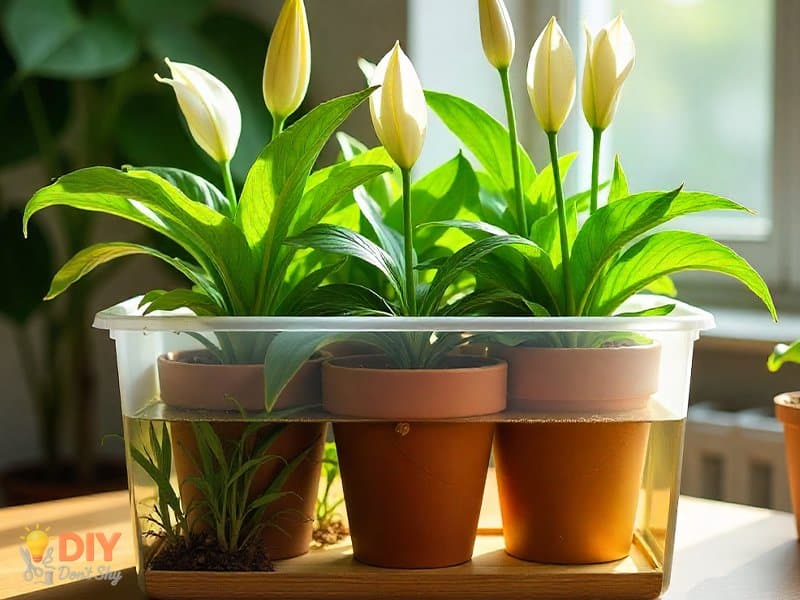
Storage Tote Watering Station
- Get a storage tote.
- Drill a small overflow hole near the top rim.
- Fill halfway with water.
- Place bricks or a wire rack inside as a platform.
- Thread wicks up from the water to the pots.
- Place plants on top and cover loosely with the lid.
This setup can keep multiple plants alive for a month. It’s a lifesaver.
Soil Moisture Calibration Test
Water a plant, weigh it, then reweigh 24 hours later. See how much water it loses. Adjust wick thickness or bottle holes so the supply matches the need.
How To Water Plants While Away For 2 Months
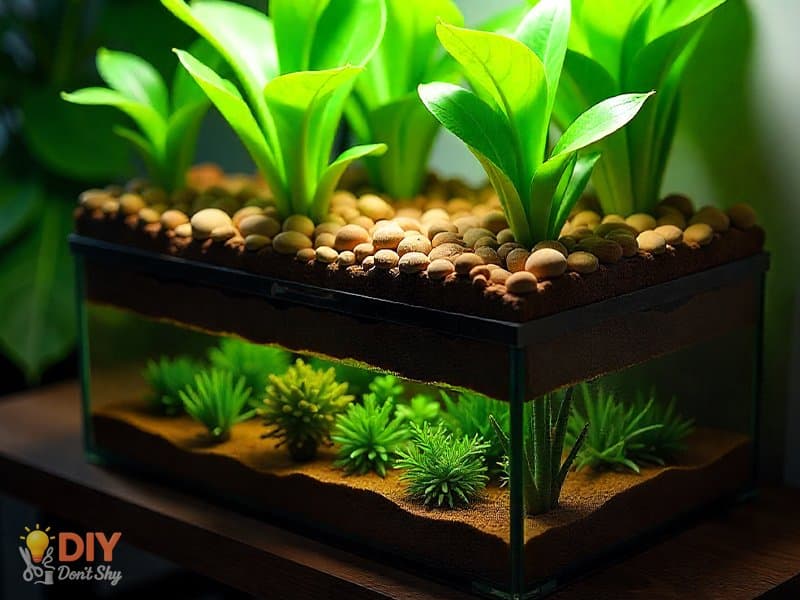
Semi Hydro LECA Conversion
Plants in LECA (clay pebbles) do well with covered reservoirs. They last weeks before needing a refill. Good for pothos and philodendron.
Reducing Growth To Save Water
Less light equals slower water use. Pull blinds for indirect light. Lower the temperature a bit. Trim off excess leaves. This buys you time.
How To Water Plants When Away For 3 Months
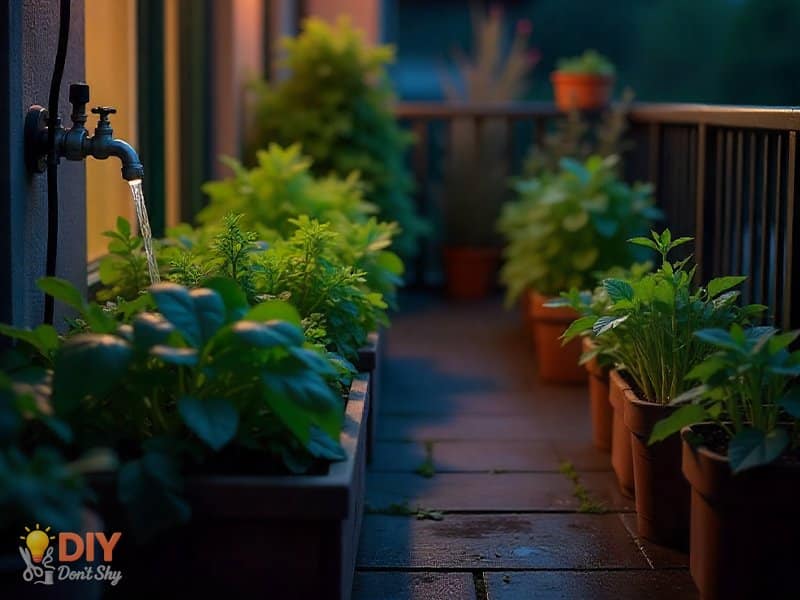
Outdoor Drip With Timer
For patios and balconies, use drip irrigation. Connect a timer to a spigot or barrel. Set it for short watering sessions every couple of days. Test it thoroughly before you leave.
Indoor Long-Term Setup
Fill a 5-gallon bucket. Thread thick wicks through the lid and into several pots. Add a large clear tent around plants to hold humidity. That combo keeps soil damp for months.
You May Want to See: Homemade Air Freshener With Fabric Softener
DIY Self Watering System For Outdoor Plants
Drip Lines With Timer
Run tubing to each container. Adjust the drippers so water matches each plant’s needs. Clear labels make it easy for a friend to help if needed.
Rain Barrel And Gravity Feed
No spigot? Use a raised rain barrel. Keep it covered. Gravity alone can push water through drip lines if tubing is short.
Protecting Against Heat
Shade cloth reduces evaporation. Mulch helps too. Grouping containers together blocks hot wind.
How To Water Plants While Away With Water Bottle
Single Plant Drippers
One or two liter bottles are enough for medium plants. Always water first, then add the dripper. It maintains moisture; it won’t fix dry soil.
Multi Plant Bottle Manifold
Drill the cap, attach a T-fitting, and run tubing to two pots. A fun hack if you’ve got matching plants nearby.
Plant Specific Adjustments
Succulents And Cacti
Water before leaving, then stop. They prefer drier soil. Place them somewhere cool with plenty of light.
Herbs And Leafy Greens
These plants drink fast. Use double wicks or bottle drippers plus a humidity tent. Pinch stems before leaving to slow their pace.
Flowering And Fruiting Containers
Tomatoes, peppers, and annuals outside need drip irrigation. Indoors, move flowering plants out of direct sun to conserve water.
Large Floor Plants
Use a 5-gallon bucket with thick wicks. Place it just slightly higher than the pot base. Always allow some airflow to avoid soggy soil.
Testing And Troubleshooting
Run A One Week Trial
Pretend you’re gone. Fill everything, leave it alone, then check soil and reservoirs after a week. Adjust if needed.
Fixing Common Problems
Bottle empties too fast? Hole’s too big. No water coming out? Hole’s clogged. Water running down the sides of soil? Rough up the top and water more slowly.
Safety And Common Mistakes
Avoid Overwatering
Too much water suffocates roots. Wicks are safer than direct hoses. Keep soil moist, not swampy.
Timer And Power Checks
If you’re using a timer, swap in new batteries before leaving. Write the schedule down and stick it on the timer so anyone helping can confirm settings.
Creative Variations
Decor Friendly Reservoirs
Hide jars in baskets or use painted bottles. They can look intentional instead of improvised.
Recycled Materials
Plastic soup containers, shoelaces, chipped mugs; these can all become plant helpers. DIYDONTSHY readers often share clever hacks like this.
Real World Plans By Trip Length
Two Weeks Visiting My Parents
Group plants on a tray. Use jars with wicks. Cover lightly with clear plastic.
Three Weeks Away
Upgrade to bigger reservoirs, use double wicks, and reduce light levels.
One Full Month
Storage totes indoors, drip timers outdoors. Shade and mulch if it’s hot outside.
Two To Three Months
Go all in with drip systems outside and large wick reservoirs inside. Leave instructions and backup batteries for someone to check in.
FAQ About Watering Plants
How thick should a wick be?
About pencil thickness. Adjust if soil dries too quickly.
Do I add fertilizer?
For trips longer than four weeks, add diluted fertilizer before leaving.
Can synthetic cords work?
Yes, nylon and polyester cords carry water too.
What about pets?
Hide water containers or tuck tubing behind pots so they don’t mess with it.
Will plastic covers cause mold?
Leave a small gap for airflow. Keep plastic off the leaves.
Lessons Learned
Leaving your plants doesn’t have to end with wilted leaves and dead soil. With wicks, bottle drippers, tote setups, and drip systems, you can step away for weeks, even months, and still return to green, thriving pots. Test early, adjust as needed, and label everything so there’s no confusion.
And if you’d like help picking the simplest setup for your exact plants, DIYDONTSHY can walk you through it. Reach out, and their team will guide you with a plan that actually works.

Kareem Sallam is an Egyptian special writer based in Australia, with a strong interest in practical ideas and creative content that focuses on everyday solutions. He writes clear, engaging articles designed to be easy to follow and useful for a wide range of readers.
His work centers on DIY projects, handmade ideas, simple crafts, and home based creativity. Kareem aims to deliver content that is practical, inspiring, and accessible, helping readers turn simple materials into smart and enjoyable projects.

